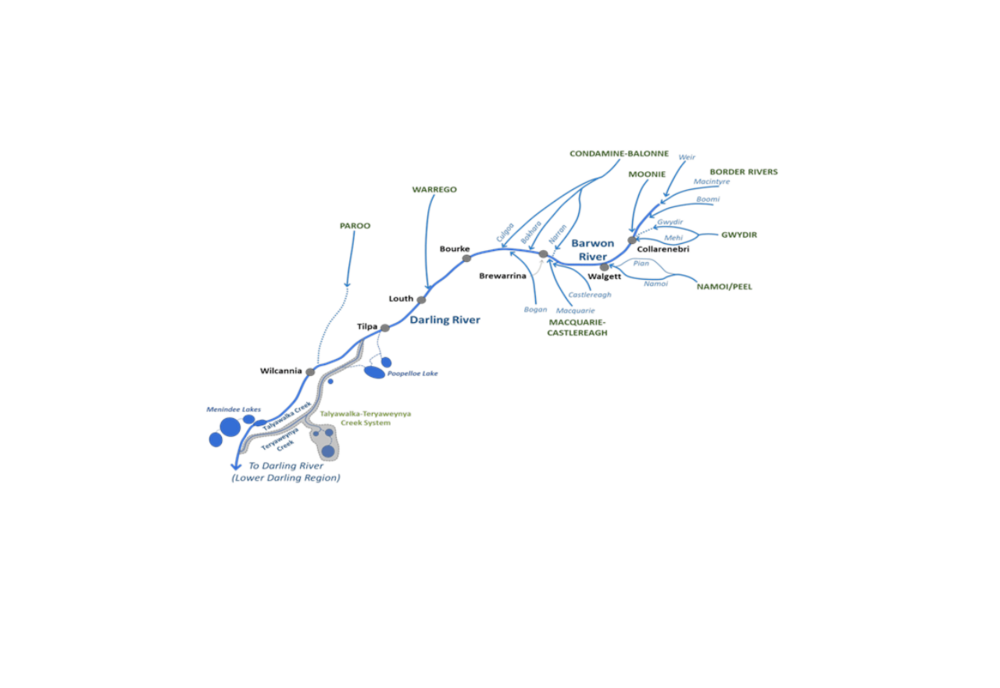Barwon-Darling needs flow targets: report
River McCrossen
12 August 2024, 2:40 AM
 The final report Connectivity Expert Panel has drawn debate over proposed rules on flow targets and floodplain harvesting. IMAGE: NSW Government
The final report Connectivity Expert Panel has drawn debate over proposed rules on flow targets and floodplain harvesting. IMAGE: NSW GovernmentRestrictions on flood plain harvesting, minimum flow rules and dam releases are needed to preserve water flows in the Barwon-Darling.
Those are some of the suggestions in a final report released by a Connectivity Expert Panel to maintain water flows in the Barwon-Darling River system.
The Connectivity Expert Panel, chaired by Amy Dula from the Natural Resources Commission, was convened in August 2023 by Minister for Water Rose Jackson.
The panel was given a broad terms of reference to provide advice on topics including water sharing plans, flood plain harvesting and triggers for dry time rules in the Barwon-Darling, which flows down from Mungindi in Queensland through Western Plains towns Collarenebri, Walgett, Brewarrina and Bourke before heading south-west to the Menindee Lakes.
It is used for town and stock water supplies as well as irrigation, and hosts native fish including Murray cod and golden perch.
The report states that current management of the Northern Murray-Darling Basin, which includes the Barwon-Darling River, is unhealthy for the system.
"Small and medium sized flow events have been impacted due to extraction for irrigation and capture by dams. These changes to the hydrology of the system are having a significant effect on connectivity, ecosystem resilience and environmental, social and cultural outcomes," the report said.
"The system is currently being operated in a way that runs it dry and then restarts it much more frequently than would have historically occurred.
"This is highly inefficient as the riverbed acts like a sponge; the drier it gets the more water it takes to get flows downstream as the riverbed soaks up flows, and the pools and weirs must be filled along the way.
"This has negative impacts on the ecosystem and communities downstream, particularly the Aboriginal communities who place a high cultural value on flowing rivers."

The Murray-Darling River System. SOURCE: Murray-Darling Basin Authority
The report recommends minimum daily flows at the end of water systems to reach 'base flow' targets in the Barwon-Darling.
Base flows are continuous low-lying flows in a river which support and life cycle of water-dependent plants and animals during dryer months.
The report proposes triggers for dry time restrictions when flows dip beyond baseflows for 90 days at different locations throughout the system.
It also says there are "considerable limitations" of evidence to asses connectivity issues, including data on floodplain harvesting.
Balanced use required - Butler
State MP for Barwon, Roy Butler is wary of making decisions around flow targets.
"You don't keep adding ingredients to a dish without tasting what the impact of the previous ingredients are, and it's the same with water," he said.
"I just want to make sure we understand what the implication of what we've already done is because I don't think anyone has a really firm grasp on that.
"We've got to strike a balance where we can have economic activity and we can have a healthy river as well."

Member for Barwon Roy Butler. PHOTO: Facebook/ Roy Butler MP
For it's part, the report says policy can still be made without "perfect information."
"These are merely limitations; they do not mean that suitable action cannot be taken using a precautionary approach based on the best information available to us now. This will in turn require that rules are adaptively managed as better information and improved modelling become available," it said.
The 120-page report drew criticism from the NSW Irrigators’ Council (NSWIC) over recommendations to restrict floodplain harvesting.
Floodplain harvesting is when the water that flows across the floodplains during a flood is collected and used later.
“On the basis of little more than it ‘feels right’, the panel wants the Government to restrict the ability of farmers and communities in the Border Rivers, Gwydir and Namoi valleys to divert water in times of plenty to tide them through dry times," NSWIC CEO Claire Miller said.
Conservation Council backs recommendations
Nature Conservation Council of New South Wales water campaigner Mel Gray said the government should implement the recommendations in full.
"Failing to implement these recommendations would sacrifice dozens of towns and local economies along the river from Bourke to Wentworth, just to maintain the inflated profits of a few industrial cotton operations upstream," she said.
While the report has a summary, Mr Butler said there should be "plain English" explanations of it publicly available.
"What's really important is - and I don't say this to be negative - plain English explanations of what we're talking about," he said.
"This report - the length and complexity of it - unfortunately there's a lot of people that'll look at that and go 'just don't have time to try dive in.'"



